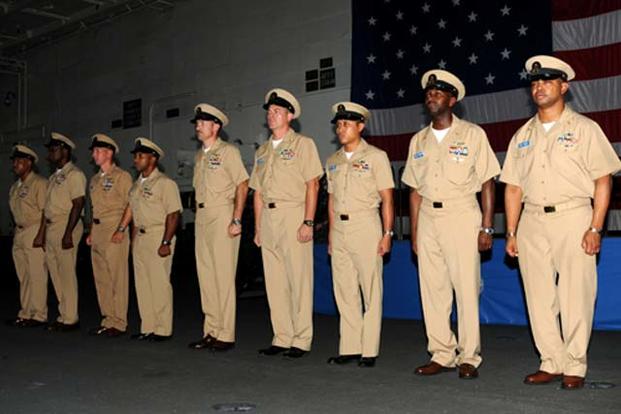The Navy has scrapped a selection board already in progress for next year's master chief petty officers and launched an investigation after discovering evidence that several board members had acted improperly in a way that affected the process.
The service convened the board April 3, but received a report April 11 that deliberations for the Fiscal 2018 Master Chief selection board may have been compromised, Lt. Cmdr. Nathan Christensen, a spokesman for the Chief of Naval Personnel, told Military.com.
According to a source familiar with the investigation, only a few of the 112 board members convened are suspected of wrongdoing. The allegations referred to inappropriate communication outside the formal board process, potentially designed to influence the process, according to the source.
On April 12, Navy leadership decided to adjourn the board, invalidating the incomplete selection results. An investigation was launched by Naval Personnel Command to look into alleged wrongdoing.
"We take this allegation very seriously," Christensen said.
Substantiated wrongdoing by members of the board, which is largely made up of master chiefs, may punishable by a variety of administrative actions or nonjudicial punishment.
The board, which selects for the Navy's senior enlisted rank, is a detailed process that typically takes up to two weeks. This year, there are 3,418 eligible senior chief petty officers who will be reviewed to fill just 506 master chief positions across the fleet, meaning candidates reviewed by the board have about a 15 percent chance of advancement. That's a small increase over last year, when just over 13 percent of senior chiefs were promoted.
The Navy plans to reconvene the selection board later this year with all new members to ensure that no integrity of the process is compromised. A date for that board to convene has not yet been announced.
It's not the first time the Navy has investigated allegations that one of its advancement boards might have been compromised. In 2005, the Inspector General of the Bureau of Naval Personnel was called upon to investigate when working documents from that year's senior chief petty officer selection board were made public without authorization.
Ultimately, the IG determined that the results of that board were not compromised and would be released as planned.
"The Navy's board process is sacrosanct," Christensen said. "The selection board process must be a fair and impartial process."
-- Hope Hodge Seck can be reached at hope.seck@military.com. Follow her on Twitter at @HopeSeck.




























